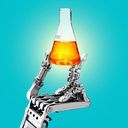Here comes the robo-lab

Laboratory "copilots" and automated labs are AI's latest contribution to speeding up the development of new drugs, chemicals and materials.
Why it matters: Scientific discovery itself must speed up if the world is to address its challenges — from climate change to personalized treatments for cancer — fast enough to make a difference.
- In scientific research, "manual effort is not scalable," writes Microsoft Health Futures' Hoifung Poon in the launch edition of New England Journal of Medicine AI.
What's happening: AI has already proven useful in identifying possible new chemical and materials compounds. Now it's helping to speed up and scale lab experiments.
- A new category of lab assistant — AI lab copilots — can now make suggestions for how researchers can advance their experiments. They can also spot patterns in scientific data that individual humans would be unlikely to notice.
- Noubar Afeyan, CEO of Flagship Pioneering and co-founder of Moderna, told Axios that AI lab copilots "help you do more in parallel" — and that he's aiming to go further, through AI "co-pioneering" to radically change scientific experimentation.
Ideas these copilots help shape can be tested in a new environment called cloud labs — automated labs that can be rented and controlled remotely, allowing experiments to be repeated at the push of a button.
- These experiments' results are fully traceable, helping to identify errors.
- Biological and chemical samples still need to be shipped to cloud lab facilities, but nearly everything can be programmed remotely over the internet, with a small on-site staff maintaining machines and resupplying liquids to equipment.
- Strateos, a Menlo Park-based cloud lab provider, says it has been able to reduce the experimental time cycle of protein engineers at University of Wisconsin Madison from 8 days to 6 hours by combining an "AI-driven protein design platform" with a cloud lab.
- Emerald Cloud Lab, whose staff includes many former Amazon warehouse workers, will open what its partner Carnegie Mellon University believes is the first remote-controlled university cloud lab in early 2024.
The big picture: Proponents of AI-driven research tools like copilots and cloud labs aim to compress the timeline of uncertainty that exists around experimentation and make it easier to identify the errors that have caused a replication crisis in science.
- They also aim to expand who can access top equipment by making it rentable and running it 24/7.
Go deeper: Carnegie Mellon researchers reported in December that an AI system known as Coscientist had designed, planned and executed a chemistry experiment, including chemical synthesis of compounds and the control of liquid-handling instruments.
- Based on its initial success using both OpenAI's GPT-4 and Anthropic's Claude, the researchers predict "tremendous discoveries, unforeseen therapies and new materials" from future AI copilot work.
- MIT's Zhichu Ren developed a lab assistant known as CRESt — for Copilot for Real-World Experimental Scientist — which suggests experiments, retrieves data, manages equipment and guides researchers to the next steps in an experiment.
- Ren and his colleagues expect semi-autonomous workflows will be a common step towards a network of fully autonomous labs.
- "It takes a lot of handholding and communication to teach a toddler to walk, and one should expect the same with active learning and artificial intelligence-driven experiments."
Driving the news: Health tech innovators are gathering this week for JP Morgan's annual health investment conference.
- In his annual letter to investors Monday, Afeyan writes that "the nature of scientific discovery is changing and the necessary components for biotechnology company-building are diffusing globally."
Yes, but: AI systems today don't have the capacity to learn from failure, which has been the source of many human scientific discoveries.
- Penicillin, the original antibiotic which transformed medicine, was discovered through an unintended fungal contamination noticed by a human being in the lab. It took 15 years of trial and error before mass production of penicillin began in 1943.
- AI also isn't the only way to achieve personalized healthcare breakthroughs. The Mayo Clinic has pioneered the use of 3D anatomic modeling labs, which print 3D models of individual patients subject to complex surgeries and treatments.
Flashback: 2023 was a year of discovery, per Axios' Alison Snyder, and the overall trend is towards greater cross-border scientific collaboration.
What they're saying: "We have enough to do some pretty remarkable things," Afeyan said.
- "There are still monumental challenges," writes Poon, but mulitmodal generative AI will allow scientists to "drastically accelerate progress toward precision health."
- But the New England Journal of Medicine AI urges scrutiny: "AI must meet the same bar for clinical evidence that is expected from other clinical interventions," writes Isaac Kohane in the publication's launch edition editorial.